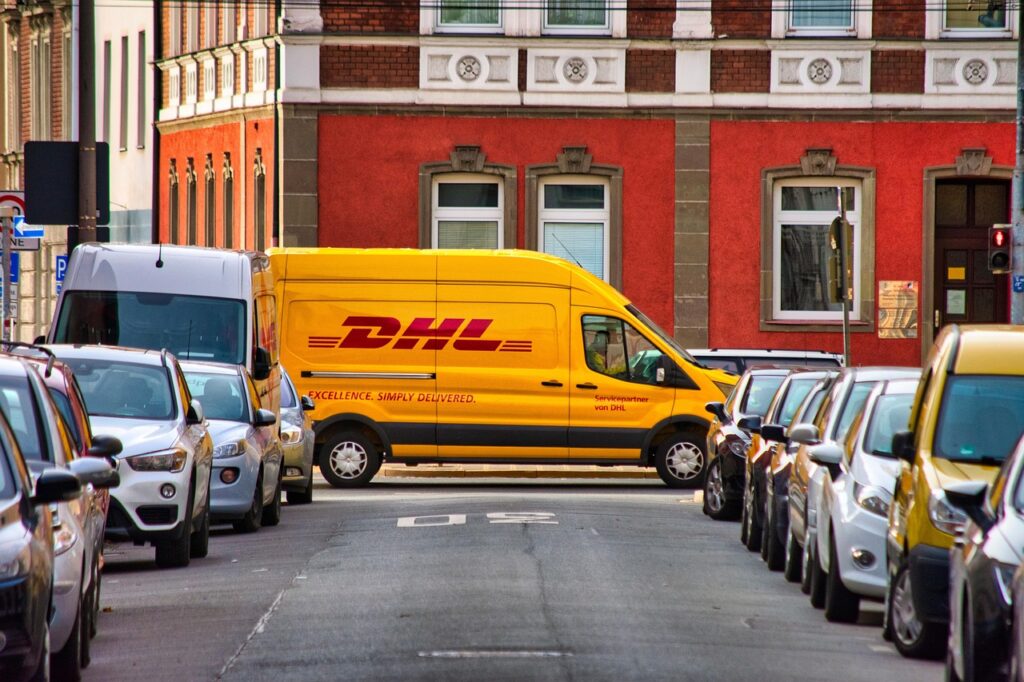DHL Express has paused deliveries of parcels over $800 to the United States, starting this week. The move follows stricter customs rules tied to trade policies introduced during Donald Trump’s presidency. DHL says the paperwork for such shipments has become too complex, causing long delays and rising costs.
High-Value Packages Affected
From now on, customers worldwide will not be able to use DHL to send packages worth more than $800 to people in the US. This suspension includes personal and online retail deliveries but does not affect shipments between businesses. DHL says this policy will stay in place until further notice.
The company explained that customs procedures for parcels valued above $800 have become much harder to manage. There is now more paperwork, and each package must go through a detailed clearance process. DHL has been overwhelmed by the number of formal customs checks it must handle every day.
Business Deliveries Continue but May Be Delayed
While DHL will continue handling business-to-business deliveries to the US, it warns that delays are likely. The company is working to grow its customs staff and systems to handle the new rules. However, it may take time before shipments move smoothly again.
DHL noted that in the past, parcels valued under $2,500 could enter the US using a fast-track system with limited forms. But with the introduction of stricter tariffs and trade barriers, that easier process is now only available for goods under $800. As a result, many high-value shipments now need full customs clearance.
New US Trade Rules Aim at Chinese E-Commerce
The US government plans to close what it calls a loophole in import laws starting 2 May. The change will end the duty-free treatment of goods valued under $800 if they come from certain sources like Hong Kong or mainland China. This new rule targets large e-commerce platforms such as Shein and Temu.
Officials say these platforms have taken advantage of low-value package rules to avoid paying duties and taxes. There are also claims that some sellers hide the true contents of shipments to avoid detection. Authorities argue this has allowed dangerous items like fentanyl to enter the country.
The White House says the crackdown is part of its fight against the opioid crisis. It believes closing this loophole will reduce the illegal flow of synthetic drugs into the U.S. Customs and Border Protection (CBP) data shows that many fentanyl shipments are mislabeled to avoid checks.
In response, China stated that drug abuse is an internal US issue. It also claimed its own drug laws are strict and enforced. Chinese officials pushed back on accusations that their exporters are smuggling illegal goods.
Hong Kong Stops US Shipping in Protest
In a surprising move, Hongkong Post has announced it will stop accepting all sea mail bound for the United States. Starting 27 April, it will also stop taking any US-bound packages. The agency said this decision is in direct response to what it sees as aggressive and unfair US trade actions.
The statement accused the US government of disrupting global trade by applying new tariffs and customs rules without warning. Hongkong Post called the changes damaging to small businesses and ordinary consumers.
This is not the first time international shipping has been affected by political tensions. In recent years, the US has added various trade restrictions targeting imports from China. These include limits on technology products, heavy tariffs on steel and aluminum, and actions aimed at controlling supply chains.
E-Commerce Retailers Prepare for Higher Costs
Online shopping platforms that rely on quick, low-cost shipping are now facing serious disruptions. Retailers like Shein, Temu, and others who depend on the low-value shipping rule will need to change their operations. Many may have to raise prices or delay orders as new customs duties take effect.
Shoppers in the US who regularly buy goods from overseas may start to notice slower deliveries and higher final costs. Small businesses that ship high-value products to customers in America are also concerned about their future.
Experts in international trade say this shift could affect millions of parcels each month. They also believe that other shipping carriers might follow DHL’s lead if customs processing becomes too slow or costly.
DHL’s Decision Could Set a New Standard
With DHL being one of the biggest names in global shipping, its decision to halt high-value deliveries to the US is being watched closely. Competitors like FedEx and UPS are under pressure to share how they plan to respond. If they too pause or restrict services, global e-commerce could see major changes.
Consumers and sellers alike are urged to check with their delivery providers before sending items to the US. DHL advises anyone shipping to America to keep packages below the $800 limit for now.


